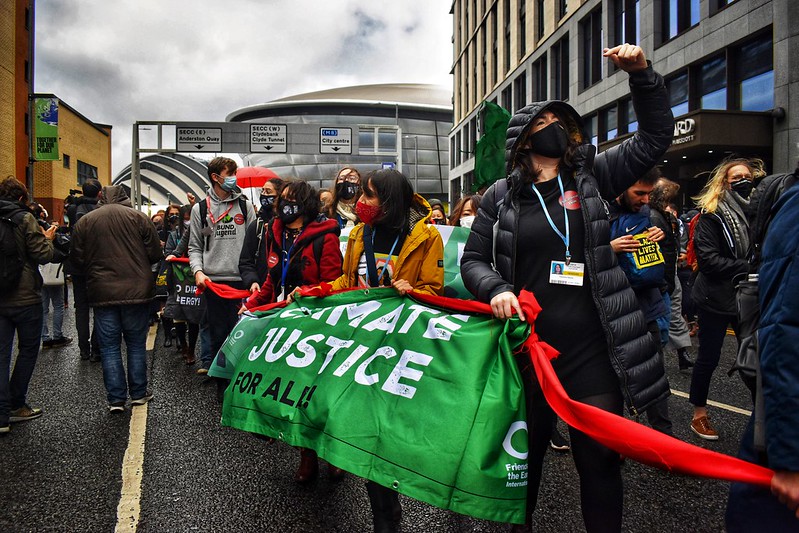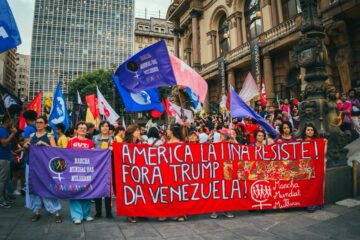Feminist economy and environmental justice are closely connected. They both provide strong criticism of the false solutions offered by capitalism to the crisis capitalism itself has created. And they both propose grassroots struggles that point toward a reorganization of society, ways of life, and the relationship between human beings and nature. Nevertheless, articulating these agendas together across movements, organizations, and territories is something that requires continuous efforts.
With this in mind, the World March of Women (WMW) Brazil was invited by Friends of the Earth International (FoEI) to organize an education cycle on feminist economy, in collaboration with the organization’s Gender Justice and Dismantling Patriarchy group. “Friends of the Earth International works together with strategic allies, and part of this joint work includes joining our alliances in these political education efforts,” Natalia Carrau, the group’s moderator, explains.
“Feminist economy is a cross-cutting topic and a perspective that is part of the path towards system change that we propose as a federation. It seemed very natural to us to approach this topic from the different political perspectives provided by international programs,” Natalia said. This cycle of on-line activities brings together representatives from different regions and internal organizations of Friends of the Earth to propose reflections and discussions about the uses of feminist economy as a tool within the federation.
Capire and Real World Radio will publish syntheses of the discussions held in this process, as a way of recording the lessons learned and sharing ideas with a wider audience, strengthening alliances.
In module 1, Brazilian activist Natália Lobo provided an introduction to feminist economy, which should not only be understood as a theoretical framework, but as an agenda and a tool for the struggle, guiding processes of resistance and proposals for change. Natália explained the feminist critique of the androcentrism of the ruling economy, emphasizing that the white man should not be seen as the universal subject. Conversely, we must recognize and incorporate women’s economic experiences, making the necessary labor to sustain life visible, as it goes far beyond what the market considers to be labor within the monetary sphere.
This is why solutions should not come from the market. Hiring a domestic worker, for example, does not solve the issue of women’s overburden—it actually exacerbates it, as it is concentrated on a specific group of women, marked by class and race. The proposal is to de-commodify and reorganize labor, holding the state and society at large accountable. Care must be shared between people, families in all their diversity, communities, and the state. The political and economic experiences built by women across the continent are an essential part of this long-accumulated understanding, opposing the logic of capital with the everyday building of self-organization, agroecology, communication, solidarity economy, and strategies to ensure the conditions of survival and to build autonomy over bodies and sexualities.
Module 2 sessions were divided into regions of the world, to suit the different time zones where different participants were based. Tica Moreno, from Brazil, delivered the keynote speech for one of the groups, and Sophie Ogutu, from Kenya, for the other. “We formulate on the basis of practices and struggles. Concepts are not abstract things we just replicate—they come to life in the context of our movement-based strategy for change. The meetings and convergences between our organizations are part of this process of long-accumulated understanding and formulation,” Tica said at the beginning of her speech, referring to the importance of political alliances.
Tica looked back on relevant alliance-building moments for a feminist economy: confrontations with neoliberalism, free trade agreements, and the corporate power of transnational corporations; joint formulations on digitization and green capitalism, and others. One of the contributions of feminist economy is the broadening of the concept of capital-labor conflict, proposing that it is a capital-life conflict. It thus considers other spheres of human life that are affected by racist and patriarchal capitalism beyond paid labor, as well as the impacts on non-human life, i.e. nature. “There is a set of relationships and practices, even in our relationship with nature, which sustains and allows us to generate the conditions for the possibility of life,” Tica argues.
In Group 2’s session, with participants from the Asia-Pacific region, guest Sophie Ogutu reiterated the importance of building a feminist political subject that is expressed in the struggles of grassroots movements and on the ground: “We cannot be talking about political subjects without talking about collective power,” she said, adding that, “when we bring our conversations, we get them off our desks and take them to the communities, we bring them, we get them together, but we trickle it down. That is how we are going to build that collective power, and that is going to help us a lot in terms of emphasizing how feminist economies foster political subjects who resist dispossession and exploitation.”
Sophie argues that we must forge an anti-systemic feminist critique, because “we cannot crush down patriarchy if we cannot mention patriarchy, we cannot bring down capitalism if we are afraid to mention who’s behind it, who feeds capitalism. We cannot handle anything if we are so afraid to.” The strategy for feminist change lies in “building that collective power, by going back to our communities and engaging them,” she says.
“From the questions raised by feminist economy about the capital-life conflict, we have to look at how systems of oppression also arise from the international division of labor and what this implies for the peoples of the global South,” Natalia Carrau notes. Participants took part in the discussions, sharing perspectives from their territories and regions, creating connections for an internationalist vision. They reflected on the contributions of feminist economy to the struggles for environmental justice, which intersect mainly in the critique of the market and resistance to the impacts of transnational corporations on territories. They also intersect in proposing feminist, anti-systemic alternatives that challenge the logic of the market and show that another economy is already possible today. One example is agroecological field books, used by women farmers in several parts of Brazil to record trade and exchange of food they produce, as a tool for making their labor visible.
“What are the spaces or networks that we can have and weave to take care of ourselves and to be able to think about the future, about how to share tools beyond this group, in a context in which everything is increasingly violent and life in the territories is increasingly complex?” asked one of the participants, pointing to future discussions that will follow in module 3 of this education cycle, which will focus on the next steps in building a feminist economy in Friends of the Earth International.




